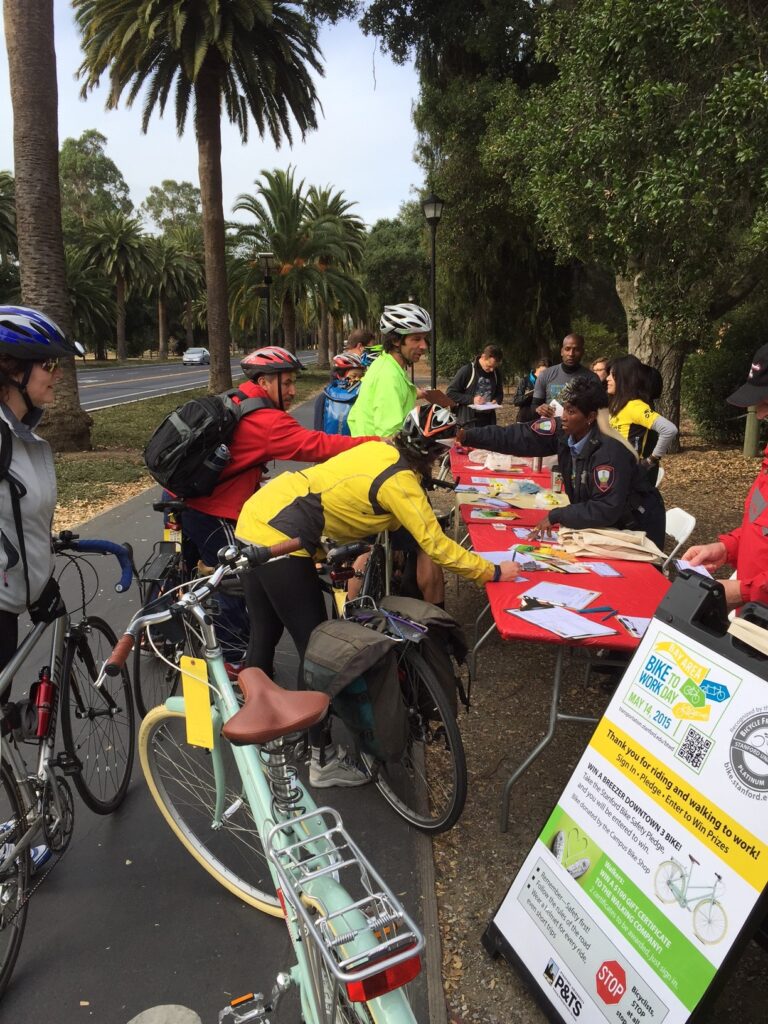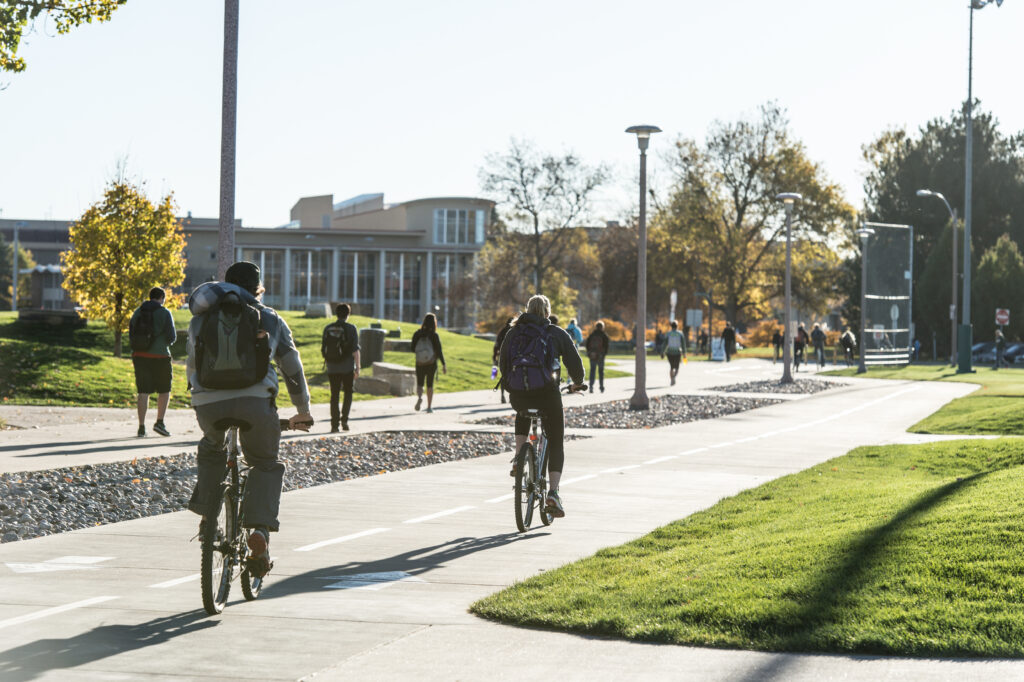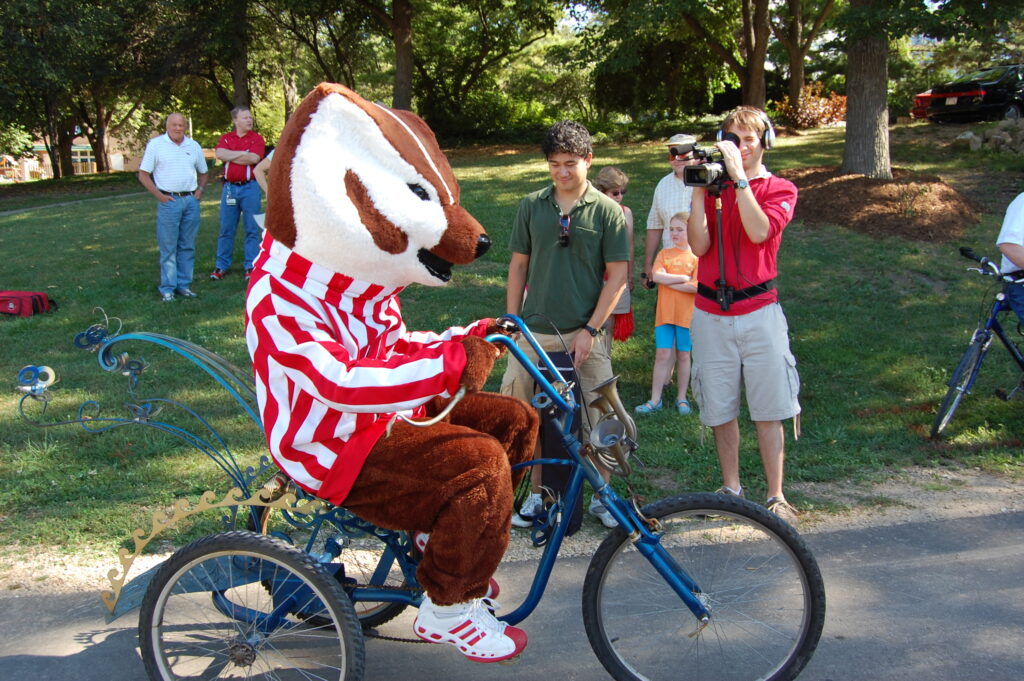DISCOVER YOUR LOCAL BICYCLING COMMUNITY
Find local advocacy groups, bike shops, instructors, clubs, classes and more!
The Platinum Standard: How Stanford, CSU, and UW Madison Achieved Top Marks as Bicycle Friendly Universities
When it comes to fostering a culture of cycling on campus, only a select few universities have achieved the highest award level of Platinum Bicycle Friendly University (BFU). In last year’s round of BFU awards, three institutions— Stanford University, Colorado State University (CSU), and the University of Wisconsin-Madison—have risen to the top of their class as renewing Platinums and leaders in the BFU program. These campuses have gone above and beyond to create safe, accessible, and innovative cycling environments for their students, faculty, and staff. Join us as we dive into what makes these universities stand out and how they’re leading the charge for better biking from campus to the broader community.
Stanford University in Stanford, CA
- First applied: 2011
- Achieved Platinum in: 2011
As the first university to achieve Platinum Bicycle Friendly University status in 2011, Stanford University has consistently set the standard for improving cycling accessibility and safety in higher education. With extensive on-campus bikeways, over 20,000 bike parking spaces, and twelve bike repair stands across campus, Stanford continually prioritizes improvements to support the 22% of students who commute via bike. Recent initiatives include a separated bike lane pilot on Santa Teresa, improving safety for both bicyclists and motorists, and a campus-wide “Share the Road” training webinar to encourage mutual respect among all roadway users.

Stanford’s efforts also focus on inclusivity, using Transportation Survey data to identify demographic trends in bike commuting and ensure equitable access to safe cycling. Their efforts extend beyond campus, working in partnership with local nonprofits like Live in Peace Bike Shop by donating bikes and revamping their bike mechanic apprenticeship program. Ariadne Scott, Stanford’s assistant director of active mobility, is looking to increase that support even more: “The Transportation team continues to prioritize understanding and erasing barriers to help unlock a more inclusive bicycle community across Stanford and beyond.”
Keep reading about how Stanford continues to excel as a BFU »
Colorado State University in Fort Collins, CO
- First applied: 2011
- Achieved Platinum in: 2015
Colorado State University (CSU) has earned Platinum Bicycle Friendly University status through its ongoing commitment to creating a safe and inclusive cycling culture. CSU integrates cycling into its recruitment efforts through events like campus bike tours for prospective students and a “We Ride” event during move-in weekend, promoting bike culture from day one. We’re particularly excited about their growing list of bike-related courses — from learning the basics of bike riding in “Learn to Ride” to assembling and tuning an entire bicycle in “Bicycling 201: Bike Build,” CSU’s class list offers a variety of on-bike and off-bike options for students.

CSU’s focus on equity and safety is equally impressive. Their student-run bike shop, The Spoke, offers affordable long-term bike rentals to make cycling more accessible, as well as intentionally recruiting mechanics who are women, bilingual and people of color, to create a welcoming environment for all on campus. CSU also connects students with cognitive disabilities with bike buddies to help them learn their bike routes to campus. Additionally, through initiatives like bilingual wayfinding and the Vision Zero Task Force, CSU strives to ensure that all people and all transportation modes are accommodated.
Learn more about CSU’s innovations by checking out their impressive application materials here »
University of Wisconsin at Madison in Madison, WI
- First applied: 2011
- Achieved Platinum in: 2019
Since earning its Platinum Bicycle Friendly University status in 2019, the University of Wisconsin-Madison has continued to enhance its bike-friendly infrastructure. The campus now boasts 16,540 bike parking spaces, surpassing the number of car parking spots by about 20%. With five miles of off-street bike paths, five miles of on-street bike lanes, and a woonerf that prioritizes pedestrians and cyclists along East Campus Mall, UW Madison has made cycling an integral part of campus life.

In fact, 14% of students and 17% of UW faculty and staff use a bicycle as their primary mode of transportation. Even in the face of Wisconsin’s harsh winters, three percent of students and staff still continue to bike throughout winter months, a testament to the university’s strong cycling culture. Recent initiatives include hiring a dedicated bicycle educator, implementing multi-modal traffic counting software, and creating an annual pavement marking plan to improve cycling and pedestrian infrastructure.
Conclusion
The path to Platinum is no easy feat, but these three universities have proven that strong leadership and a commitment to cycling can transform campuses. As we celebrate their successes, their stories offer valuable lessons for any institution of higher education looking to promote active transportation. Stay tuned for our next round of 2024 BFU awards announcements in the coming weeks, and mark your calendars for the 2025 Bicycle Friendly University application opening soon as well! Keep an eye out at bikeleague.org/university, and get started with the basics by watching our BFU 101 webinar.